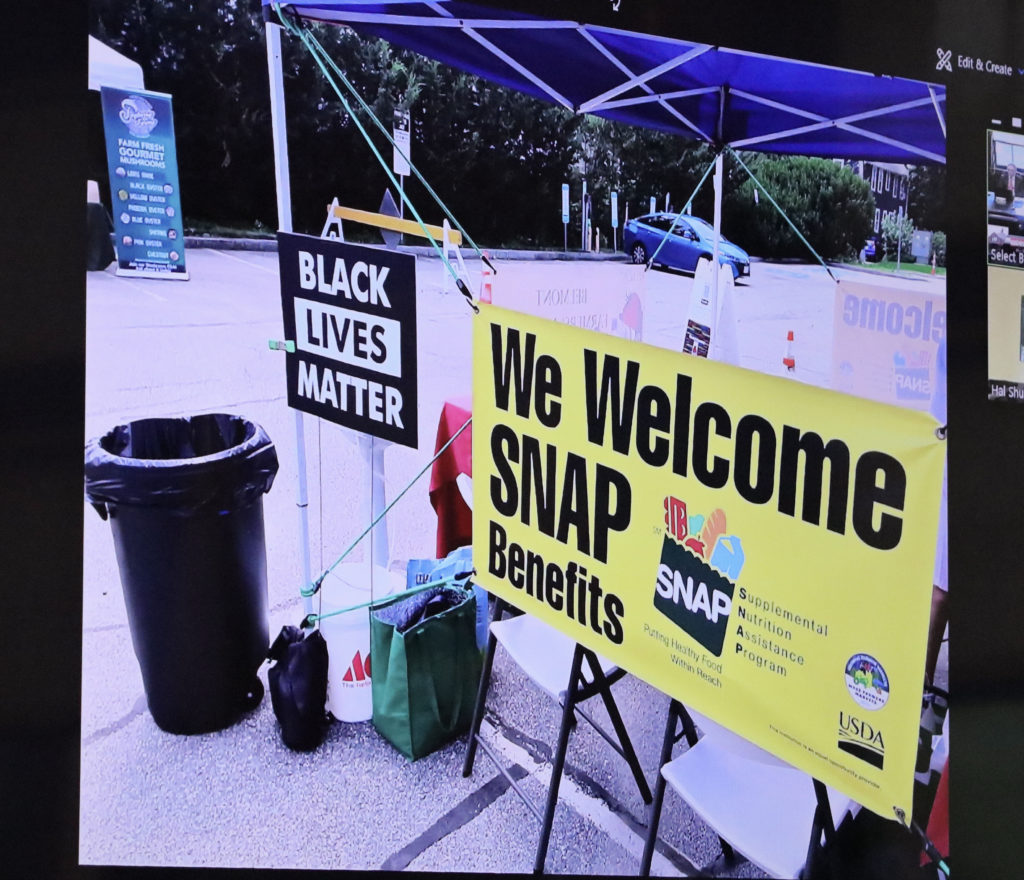Photo: Black Lives Matter sign at Belmont Farmers Market
Since last summer, Black Lives Matter signs have become a familiar feature in Belmont placed on yards, fences, windows and cars showing ones commitment to the current drive for diversity and racial justice.
But last week one of the signs – located on the sawhorse barrier at the market’s entry – was removed by the Belmont Farmers Market at the request of town officials after a patron questioned the political nature of the sign. The reason for its removal is where the market is location; in the Claflin Street parking lot, a town-owned property and the message the sign conveyed was a political statement.
At Monday, July 19, Select Board meeting, representatives from the Farmers Market and its parent organization the Belmont Food Collaborative came to request some guidance on where, and if, it can include the sign that expressed its support for Black Lives Matters.
In its 15th year, Belmont Farmers Market is annually permitted by the Select Board to take about a third of the Claflin lot from the first week in June to the end of October fruit, vegetables, baked goods and other Farmer Market staples.
Hal Shubin said that since the murder of George Floyd and the resulting summer of protests the market to “explicated include our Black friend and neighbors” by placing this year a Black Lives Matter sign at the weekly market located on a barrier inside the market’s boundaries.
While the market voluntarily complied with the request, Shubin told the board when discussing another incident the Belmont Police told the market that while operating on town land, it can enforce its own market appropriate rules, which would include a message on its commitment to civil rights and inclusivity.
Shubin said while he understands that creating a sign placement policy for the entire town will be difficult, “we believe signs at the farmers market and one its equipment reflects our opinion and not the town’s.”
Saying it was surprising that this issue hasn’t come up in any great way in the past, Select Board Chair Adam Dash said a new Belmont sign policy will need to walk a fine line on what is acceptable “because this is going to continue to come up.” Board Member Roy Epstein said one of his main concerns is for the town not to be sued. “I’m all in favor of freedom of expression but I don’t want a scenario that we’ll be part of a law suit,” he said.

Town Counsel George Hall said first, a new sign policy must treat everyone equally on expressive activity on town property. At the market, each of the dozen weekly vendors have the opportunity to place a sign at their workspace, said Hall. But while not wanting to limit what a vendor can post, Hall said it would be in the best interest of the market and the town not to turn the space into “essentially a bill board where it could becomes a competition where lots of different people will want to put up a lot of signs.”
Suzanne Johannet, president of the Food Collaborative, suggested a compromise of placing the placard on the manager’s tent, where the market’s volunteer staff helps customers and vendors.
“That is a even more clear expression that it is our space,” said Shubin Hall said the tent placement is “maybe the best place to draw the line” while the town cobbles together a sign bylaw for public spaces in the next few months.
“That works for me,” said Shubin, a short term solution which the Select Board agreed.